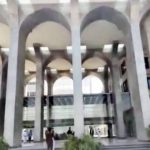UNITED NATIONS, Nov 22 (APP):A virtual joint meeting of the UN Economic and Social Council and the Peace-building Commission has discussed ways to forge solidarity and develop conflict-sensitive responses to the coronavirus pandemic, with the ECOSOC chief underscoring the need for urgent action.
“We must act together and we must act with urgency,” Pakistan’s Ambassador Munir Akram, who is also ECOSOC’s President, said in his opening remarks at the meeting which examined the nexus between the developmental and the security aspects of the crisis.
He said that a resurgence of COVID-19 underscores the need for continued vigilance and preparedness in conflict-affected countries.
In this regard, Ambassador Akram also called for the universal acceptance of UN Secretary-General Antonio Guterres’ s call for a global ceasefire, saying it must extend also to acts of violence that are imposed on peoples under foreign occupation.
The ECOSOC chief said that rebuilding better from the pandemic and getting back on track for the Sustainable Development Goals (SDGs) will not be an easy task. He therefore called for scaling up financing from all sources for these purposes.
The international community, Ambassador Akram said, must display a willingness to address structural challenges and inequalities, which are the underlying causes of many of the economic challenges and threats to peace and security which abound across the world.
“We must have the political will to, for example, reform the financial architecture to build an inclusive and equitable debt management system to have preferential banking regulations for developing countries, to build a fair international tax regime, to end illicit financial flows, and to restructure the international trade regime to offer an equal opportunity for developing countries to grow their exports, and to grow their economies,” the ECOSOC president said.
The Chairman of the 31-member Peacebuilding Commission, Ambassador Robert Keith Rae of Canada, said that in most countries and regions on the Commission’s radar, COVID-19 has exacerbated inequalities while dealing a blow to lives, livelihoods, social cohesion and governance structures.
“It’s not a good picture,” he said, with many countries one or two shocks away from falling into deep crisis. Underscoring the pandemic’s economic impact, Ambassador Rae called for an integrated and multi-sectorial global response that puts economic recovery and people’s livelihoods at the heart of peacebuilding. “We cannot afford to lose ground in the struggle to attain the Sustainable Development Goals,” he said.
The President of the Security Council for the month of November, Ambassador Inga Rhonda King of Saint Vincent and the Grenadines, said that in the face of pandemic-induced challenges, the international community must develop comprehensive approaches to address the root causes of conflict and insecurity, strengthen national ownership over peace processes and enhance inclusivity.
For its part, the Security Council, through its resolution 2532 (2020), reinforced the Secretary-General’s calls for an immediate global ceasefire to allow for humanitarian aid to be delivered. “Council Members are united in our calls for adequately financed, integrated and sustainable approaches to conflict prevention and peacebuilding in line with the principles of international law,” she said.
The UN Deputy Secretary-General, Amina Mohammed, in a pre-recorded video message, said Member States are currently negotiating resolutions on the next Quadrennial Comprehensive Policy Review and the 2020 review of the peace-building architecture, and that the 2016 resolutions on the matter led to greater coherence between development, humanitarian and peacebuilding actions.
As a result, Ms. Mohammed declared: “the United Nations system is better equipped to achieve lasting impact in contexts where development and peace efforts are integrated”.
She warned Member States that the COVID-19 pandemic drives fragility and conflict, underscoring the need for strong collaboration between the Economic and Social Council and the Peacebuilding Commission. To that end, the organs must reconcile short-term humanitarian and stabilization needs, with longer-term peacebuilding and development processes.
“Let us seize the opportunity to increase collaboration between humanitarian, development and peace actors, at all levels, to leave no one behind,” she said.






